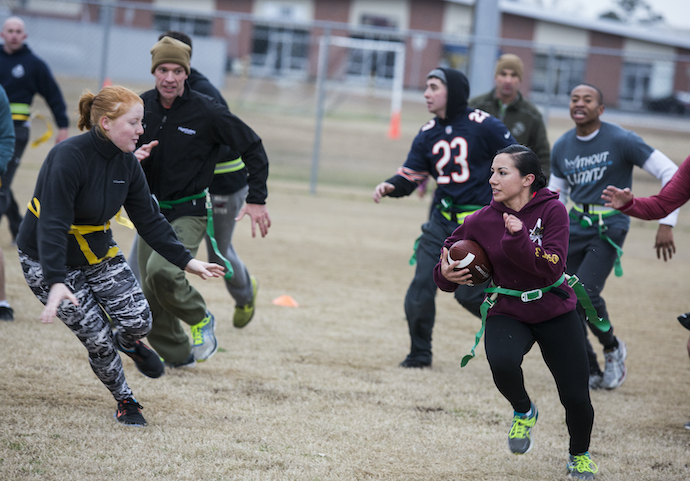Exercise is a Total Force Fitness (TFF) tool that improves your physical fitness and boosts your brain health. In 1960, President John F. Kennedy penned a piece for Sports Illustrated in which he stated that “physical fitness is not only one of the most important keys to a healthy body, it is the basis of dynamic and creative intellectual activity.” In fact, exercise supports the brain health and mental fitness of Service Members by enhancing cognition, promoting restful sleep, improving mood, and reducing anxiety and depression.
Many positive changes happen in your brain when you exercise. For example, the level of a brain chemical known as brain-derived neurotrophic factor (BDNF) increases in response to exercise. Often called a brain fertilizer, BDNF helps neurons (nerve and brain cells) grow and make connections with each other. These new connections determine how you learn and form new memories. Exercise also boosts the levels of other brain chemicals that help improve mood, build resilience, regulate sleep, sustain attention, and increase motivation. When you move your body at a high-enough intensity to increase your heart rate, more blood, oxygen, and glucose—your body’s main source of fuel—get to your brain, resulting in better mental performance. Finally, exercise balances the “fight-or-flight” and “rest-and-digest” branches of your nervous system and helps reduce your overall stress response. With all those benefits in mind, here are 3 different ways you can use exercise to improve your brain health.
Exercise for cognitive performance
One way to strategically apply the brain’s health-boosting effects of exercise is to time it before cognitively demanding tasks. Remember, exercise boosts blood flow and BDNF levels in your brain, and both changes support improved cognition. BDNF facilitates learning and formation of new memories, and increased blood flow supports cognitive processes such as attention, planning, logical reasoning, problem-solving, and decision-making. Just 10 minutes of moderate-to-vigorous aerobic activity can improve concentration, learning, and attention for up to 2 hours. If you’re looking to lift brain fog and improve cognition before a hard meeting or cognitively intense training, take a brisk walk around the block, chase your dog around your garden, or do a quick bodyweight circuit at your desk to be more attentive and focused.
Exercise for better sleep
Exercise helps you fall asleep faster and promotes more restful sleep. If you’re looking to optimize military fitness and wellness, sleep is essential. Sleep is a time for your body and brain to repair, restore, and re-energize. On average, adults need 7–9 hours of sleep per night, and the quality of sleep is equally important for optimal mental, emotional, and physical health. If you notice that you wake up feeling groggy or feel frequently run down, it’s possible that you’re not getting enough quality sleep. While exercise of any type and intensity has a positive impact on sleep, moderate aerobic exercise can increase the duration of deep sleep, which is the stage that restores your brain and body. Evening exercise can make falling asleep easier as your body temperature rises in response to physical activity and drops afterwards. This drop in temperature helps you fall asleep. However, it’s wise to avoid vigorous exercise less than 60 minutes before bed, especially if you struggle with insomnia or get too energized from your workout. If you’re trying to get more quality sleep, exercise can help you achieve your goal.
Exercise boosts the levels of certain brain chemicals that help improve mood, build resilience, regulate sleep, sustain attention, and increase motivation for better performance and military wellness.
Exercise for mental fitness
Many of the brain chemicals released in response to exercise protect your brain from the effects of stress and help to prevent mood disorders. For example, chronic stress increases your risk of anxiety and depression, but exercise-triggered brain chemicals act as a shield and help prevent those mood disorders. In other words, exercise is one of many factors that can help you build resilience. Exercise can be included as part of a holistic approach to manage anxiety and depression in the long run, and it has an acute effect on mood and well-being. Some people are familiar with the feeling of “runner’s high” or an overall feeling of well-being after a workout. The brain chemicals that promote that feeling also have an anti-anxiety effect on the brain. To build resilience and help you to maximize performance under stressful conditions, focus on creating an environment where your resources match or exceed your demands. Exercise is a safe, low-cost resource that can help you achieve this goal.
Exercise is vital for Service Members to optimize physical health and brain health. As you plan your next workout, remember that you’re also getting mentally and emotionally fitter. Some tips for success to increase motivation and make exercise a habit are to keep it simple and find activities that you enjoy. Physical activity guidelines recommend 150 minutes of moderate-intensity exercise, 75 minutes of vigorous-intensity activity, or a combination of the two every week for optimal health and performance.
